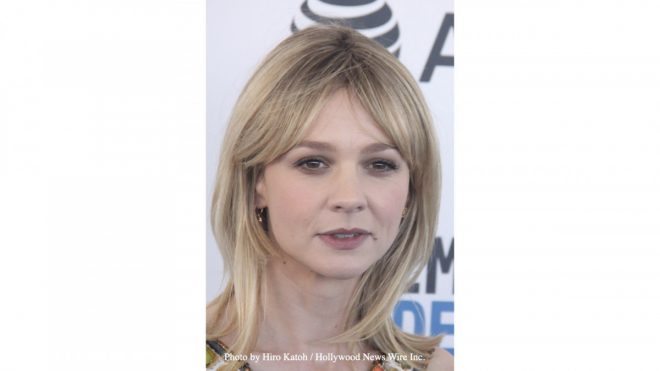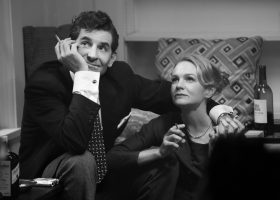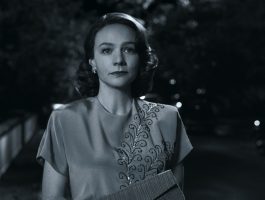By: Izumi Hasegawa February 6, 2024

One of my favorite actors is Carey Mulligan who is extremely talented, but that is not the only reason I like her. She always welcomes chatting with people who want to talk to her and she never tires of taking selfies with fans. In her movie Maestro, she plays Felicia Montealegre, who was Leonard Bernstein’s wife and proved again her stand out acting.

Q: Some actors may sort of shy away from going into a project where a scene partner (Bradley Cooper) and director (Bradley Cooper) are in the best of circumstances going to be really tired, yet because a lot is going on there’s also a beauty and a benefit to the collaboration. Could you share how you brought Felicia (Montealegre) to life and where having Bradley Cooper wear two hats made it that much easier to execute?
CM: It’s so funny that you say at the very least he (Bradley Cooper) was tired, I couldn’t tell you a day I saw him be tired. I mean, and it must have been because he was getting to work at two in the morning to be there to do the prosthetics and fully become Lenny (Leonard Bernstein) five hours before anyone else got there, but I didn’t see tired ever. I just saw it was, Sarah Silverman (played Shirley Bernstein) was talking about this last night, the joy in the way that Bradley made the film every day just so delighted to be doing it and to be making it and to be able to tell the story and that was so infectious. So I didn’t, that part of it was, it was only ever energizing to be around him. And what I’m finding so interesting now is doing press because there’s so much of it that was just, all the work was done before, so by the time we got to set, I didn’t ever sit through a thought process. I could see him thinking, he’d close his eyes for a long time sometimes. And I sort of, it’s funny, there’s these pictures of us on set that our stills photographer took where Bradley’s like standing on stage and he’s doing this and he’s got his head down, he’s got his arm across. And I’m standing right next to him just doing that. And there’s another one where you’ve got your hands on your hips and you’re looking at the floor and I’m facing the other way with my hands on the hips looking at the floor and I would just sort of stay near him and just be proximate and then the next thing would come out. So there was, I wasn’t seeing like someone, the amount of effort that was going into it, I’m sure was enormous, but I didn’t see someone being effortful. It was just he would just sort of take a second and then would know exactly what the next thing to do was and in terms of being directed by your co-star I mean first of all you’ve got an incredible actor to try and meet but then that he could also direct me through his own performance I think was the best. I mean just it was so much fun because he could elicit the response in me that he knew he would get from my portrayal of the character through the way that he played Lenny and that was a lot of the way that he worked with me was just through his own performance, which I think was just you know because he could be so instinctive with Lenny because he’d done so much to become him.

Q: What sort of things did you learn from Leonard and Felicia’s children? What character traits or what stories from them really sat with you the most that helped you become that character?
CM: Gosh, I mean, the first time I zoomed with them, because it was COVID, the first time, well, we met in 2019 in Philadelphia. They came to Candide, and that felt like sort of the blessing. You know, playing their mother, which was such an honor. And then I zoomed with them. I remember the first time I sat down with my notebook, and I was sort of ready to take notes, and then they started talking. It was like the three boxes (in the screen of Zoom), and they were all just like, you know, it was like Zoom kept on cutting out, ’cause they kept on overlapping every time. So I thought, “Okay, I’m not gonna take notes. I’m just gonna absorb all of this.” And I think the sense of fun of their family, you know, and that everything was a game, and everything was an inside joke, and that it was sort of them against everyone else. Like, there was a sense of like, they had their secret languages, they had their inside jokes, they had their traditions, they had this way of being really kind of lovingly mocking of one another. And like, it was just a family you wanted to be in, more than anything, so much love, and they just adored their parents. Obviously, you know, the more we learned about it, the more we adored them and wanted to uh… And I went to Chile, Santiago to meet her extended family, so her nephew kindly gave me a sort of tour for three days, and I met lots and lots of extended family, I meant, huge, huge family. But also, I was lucky enough to meet her brother-in-law who was in Italy with them the summer that The Private World of Leonard Bernstein (written by John Gruen) was written, so (he) was there when they were doing an interview which I had access to these incredible recordings. I went to one of her family homes and saw her paintings and you know, so I felt like just so much a kind of blessing from the whole family. But I think it was that the sense of I wanted to be in it. I listened to those recordings, and I want to be at that dinner table. You know, sounds like the most fabulous to be in and luckily, they did. They made us like a family. They really did.

Maestro is now playing in theaters and streaming platforms.
Edited by Seana Magee
